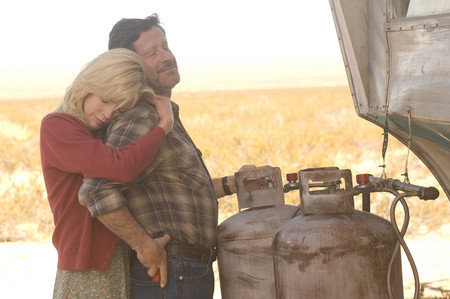‘The Burning Plain’
Don't quit your day job.
Guillermo Arriaga, this means you.
You may be the celebrated, Oscar-nominated screenwriter of such prestige movies as "Amores Perros," "Babel" and "21 Grams." And lord knows plenty of great writers -- from Billy Wilder to Woody Allen -- have transformed themselves into world-class directors.
But you've got some work to do, if "The Burning Plain" is the best you can do.
Because it proves, yet again, that there's many a slip 'twixt page and (sound)stage.
Not that "Burning Plain" has much in the way of soundstages.
Which is probably just as well, because its contrasting landscapes -- rain-swept Portland, Ore., and parched-desert Mexico, New and old -- provide locations a lot more persuasive than the characters who populate them.
And we can't really fault the performers, led by a pair of Oscar-winning actresses -- Charlize Theron and Kim Basinger -- who deserve a lot more than they get with "The Burning Plain."
A more apt title might be "The Burning Pain," because this is one of those movies in which people have scars on their bodies -- to signal they've also got scars on their souls.
It's also one of those movies in which Arriaga resurrects his trademark fractured narrative structure, in which effects always precede their causes.
You know the drill: Introduce seemingly unrelated characters involved in apparently unrelated events, scramble well, then string the audience along until the movie inevitably connects the dots, because the events and characters are inextricably connected -- as are we all. (At least that's what Arriaga keeps reminding us.)
In Portland, we meet sorrowful Sylvia (Theron), who works at an upscale restaurant and broods -- before, during and after apparently meaningless sex with one of the restaurant's chefs (John Corbett).
Maybe she's just worried about the mysterious, sad-eyed drifter (José Maria Yazpik) who seems to be following her. And maybe she has reason to worry. Or maybe not.
Meanwhile, somewhere in New Mexico, at some other time -- careworn trucker's wife Gina (Kim Basinger) sneaks away from her domestic responsibilities to conduct a passionate affair with another woman's husband, lusty Nick (Joaquim de Almeida).
Inevitably, their trysts trigger unforeseen consequences, especially when Gina's daughter (rebellious Jennifer Lawrence) discovers her mother's infidelity -- and Nick's son (equally rebellious J.D. Pardo), grown-up versions of whom also turn up as "The Burning Plain" unfolds.
Or, more accurately, unravels -- taking much of its emotional impact along with it.
By now, Arriaga's once-novel MO is so familiar we know that all will, ultimately, be explained. (Even if, in the process, some of it stretches our willing suspension of disbelief to the breaking point.)
The more pertinent question is whether we care once we learn how all the pieces of this particular jigsaw puzzle fit together.
Throughout, I kept wondering how this particular tale would play if Arriaga had dispensed with the out-of-sync narrative structure and been content to tell his melodramatic story in linear fashion.
Ah, but that would have deprived him of his favorite sleight-of-hand trick: his reliance on misdirection.
By preoccupying audiences with how various puzzle pieces fit together, Arriaga must assume we'll be too busy to ponder more important questions.
Guess again.
As he demonstrates in "The Burning Plain," Arriaga lacks the directorial command demonstrated by previous collaborators Alejandro González Iñarritu (who directed "Babel," "21 Grams" and "Amores Perros") and Tommy Lee Jones (director and star of Arriaga's best script, "The Three Burials of Melquiades Estrada").
While he builds a persuasive sense of place (thanks in large measure to Oscar-winning "There Will Be Blood" cinematographer Robert Elswit), Arriaga's sense of pace bogs down.
Rather than create an inexorable, compelling momentum, Arriaga spins his wheels, highlighting heavy-handed visual symbolism at the expense of his characters' emotional anguish. He keeps telling us what they're going through, but we never really feel their pain, burning or otherwise.
In the case of Theron and Basinger, it's not for lack of trying.
Theron (who also served as an executive producer) ably conveys her character's haunted past, even if at first we don't know what happened in it. And Basinger suggests the contradictory forces tugging Gina in opposite directions -- even as she tries to maintain both halves of her divided life.
They're a lot more interesting than the movie they're stuck in -- which seems a cruel fate for such sensitive performers.
Then again, the world according to Guillermo Arriaga is all about cruel fate. And in "The Burning Plain," that cruel fate turns out to be as much his as ours.
Contact movie critic Carol Cling at ccling@reviewjournal.com or 702-383-0272.
Carol Cling's Movie Minute
Review
"The Burning Plain"
106 minutes
R; sexual situations, nudity, profanity
Grade: C
at the Palms
DEJA VIEW
Guillermo Arriaga makes his directorial debut with "The Burning Plain," but he earned acclaim as the screenwriter of these international hits:
"Amores Perros" (2000) -- Three intertwined tales of unrelated characters, rich and poor, linked through a horrible car accident inspire Arriaga's first collaboration with director Alejandro González Iñarritu.
"21 Grams" (2003) -- Arriaga and Iñarritu reunite for this English-language drama about a freak accident that links a critically ill mathematician (Sean Penn), a grieving mother (Naomi Watts) and a born-again ex-con.
"The Three Burials of Melquiades Estrada" (2005) -- Arriaga and director-star Tommy Lee Jones won awards at the Cannes film festival for this gripping tale of a Texas ranch foreman (Jones) on a quest to find justice for the slain title character.
"Babel" (2006) -- A single gunshot echoes around the world -- from Morocco to the United States to Mexico to Japan -- in an Arriaga-Iñarritu collaboration featuring Brad Pitt, Cate Blanchett and Oscar nominees Adriana Barraza and Rinko Kikuchi.
-- By CAROL CLING
















